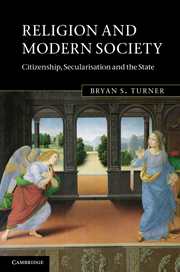Book contents
- Frontmatter
- Contents
- Acknowledgements
- Introduction: the state of the sociology of religion
- Part I Theoretical frameworks: the problem of religion in sociology
- 1 Religion, religions and the body
- 2 Émile Durkheim and the classification of religion
- 3 Max Weber and comparative religion
- 4 Talcott Parsons and the expressive revolution
- 5 Mary Douglas and Modern Primitives
- 6 Pierre Bourdieu and religious practice
- Part II Religion, state and post-secularity
- References
- Index
3 - Max Weber and comparative religion
Published online by Cambridge University Press: 05 June 2012
- Frontmatter
- Contents
- Acknowledgements
- Introduction: the state of the sociology of religion
- Part I Theoretical frameworks: the problem of religion in sociology
- 1 Religion, religions and the body
- 2 Émile Durkheim and the classification of religion
- 3 Max Weber and comparative religion
- 4 Talcott Parsons and the expressive revolution
- 5 Mary Douglas and Modern Primitives
- 6 Pierre Bourdieu and religious practice
- Part II Religion, state and post-secularity
- References
- Index
Summary
Introduction: religion as a ‘moralising faith’
There has been much academic debate about the coherence or otherwise of Max Weber's sociology as a whole. Much of the analysis has focused on the notion of rationalisation as the master theme of his sociological work. By rationalisation, Weber referred to a set of interrelated social processes by which the modern world had been systematically transformed into a rational system. Among these various processes, rationalisation included the systematic application of scientific reason to the everyday world and the intellectualisation of mundane activities through the application of systematic knowledge to practice. Rationalisation was also associated with the disenchantment of reality that is the secularisation of values and attitudes. The sociology of religion was therefore a central aspect of Weber's sociological interests as a whole. An influential interpretation of this theme of religion and rationalisation was developed by Friedrich Tenbruck (1975; 1980) in his essays on the thematic unity of Weber's work.
Tenbruck questioned Marianne Weber's description of the posthumous Economy and Society (1978) as Weber's principal work (Hauptwerk). By directing attention away from Economy and Society, he focused on Weber's various contributions to the study of religion. For Tenbruck, there is no particular key to the interpretation of Economy and Society, precisely because that text is a posthumous conglomerate of disparate elements which do not constitute a recognisable major work. Tenbruck identified the underlying anthropological dimension of Weber's sociology, namely his account of humans as ‘cultural beings’.
- Type
- Chapter
- Information
- Religion and Modern SocietyCitizenship, Secularisation and the State, pp. 53 - 70Publisher: Cambridge University PressPrint publication year: 2011



